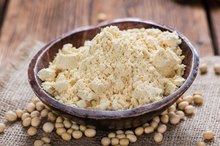What does fact checked mean?
At Healthfully, we strive to deliver objective content that is accurate and up-to-date. Our team periodically reviews articles in order to ensure content quality. The sources cited below consist of evidence from peer-reviewed journals, prominent medical organizations, academic associations, and government data.
- PLoS One: Androgenic Alopecia Is Associated With Less Dietary Soy, Higher Blood Vanadium and rs1160312 1 Polymorphism in Taiwanese Communities
- PLoS One: Androgenic Alopecia Is Associated With Less Dietary Soy, Higher Blood Vanadium and rs1160312 1 Polymorphism in Taiwanese Communities
The information contained on this site is for informational purposes only, and should not be used as a substitute for the advice of a professional health care provider. Please check with the appropriate physician regarding health questions and concerns. Although we strive to deliver accurate and up-to-date information, no guarantee to that effect is made.
Hair Loss & Drinking Soy Milk
Strong, healthy strands don't just look good -- their quality signals overall health. Dietary choices can affect your hair, so maintaining a healthy, balanced diet is key for healthy tresses. No compelling evidence indicates soy milk can prevent or reverse hair loss, but it does have nutrients that promote hair growth. Choose unsweetened milks to limit your calorie and sugar intake.
Soy and Hair Loss
One study, published in "PLoS One" in December 2013, found a possible connection between soy and hair loss. The study authors tracked the dietary habits of Taiwanese communities and found that people who ate more soy had a lower incidence of androgenic alopecia -- hormone-related hair loss 3. This study did not look at whether soy intake actually prevents hair loss, however, and it didn't look at soy milk consumption specifically. It's still too early to make any claims about whether soy really prevents hair loss.
- One study, published in "PLoS One" in December 2013, found a possible connection between soy and hair loss.
- This study did not look at whether soy intake actually prevents hair loss, however, and it didn't look at soy milk consumption specifically.
Nutrients for Hair Growth
How to Grow Hair Back After Chemo
Learn More
Although it has not been shown to halt hair loss, soy milk does have nutrients that benefit your hair. It's rich in high-quality protein, which your body can use to generate new tissue, including new hair. Depending on the type of soy milk you choose, you'll get roughly 7 to 8 grams of protein per serving. Fortified soy milks also contain vitamin B-12. That's beneficial to maintaining healthy hair because low B-12 levels can cause hair loss. A glass of fortified soy milk offers almost half the daily value for vitamin B-12. On the other hand, nonfortified soy milks don't contain any B-12, so check the nutrition label on your favorite brand to make sure it's fortified.
- Although it has not been shown to halt hair loss, soy milk does have nutrients that benefit your hair.
Risk of Allergies
Soy is among the most common food allergens, and soy products -- including soy milk -- might worsen hair disorders if you're allergic, according to the University of Maryland Medical Center 2. If you're suffering from hair disorders, cutting common allergens out of your diet might improve your symptoms, but you should only try an elimination diet under medical supervision 2. If you're not allergic to soy, however, eating it in place of red meat might improve the health of your hair, reports the medical center.
Shopping Tips and Serving Suggestions
Vitamin B-6 and Hair Regrowth
Learn More
While soy milk has several nutritional benefits, like high-quality protein, sweetened varieties are high in calories and sugar. Different brands of soy milk have slightly different nutritional values, but sweetened soy milks have 20 to 50 more calories per cup than unsweetened soy milks and 3 to 8 grams more sugar. If unsweetened soy milk tastes bad to you, try using a natural sweetener, like stevia, that doesn't contain added sugar. You could also mask its flavor by using it in recipes – it works well in place of dairy milk in soups, smoothies and baked goods.
Soy is also one of the most abundant crops in the United States, so most soy milks contain genetically modified organisms. If that's a concern, select organic soy milk to avoid GMOs.
- While soy milk has several nutritional benefits, like high-quality protein, sweetened varieties are high in calories and sugar.
- Soy is also one of the most abundant crops in the United States, so most soy milks contain genetically modified organisms.
Related Articles
References
- Go Ask Alice: Vegetarian -- Hair Loss?
- University of Maryland Medical Center: Hair Disorders
- PLoS One: Androgenic Alopecia Is Associated With Less Dietary Soy, Higher Blood Vanadium and rs1160312 1 Polymorphism in Taiwanese Communities
- Phillips TG, Slomiany WP, Allison R. Hair Loss: Common Causes and Treatment. Am Fam Physician. 2017;96(6):371-378.
- Watras MM, Patel JP, Arya R. Traditional anticoagulants and hair loss: a role for direct oral anticoagulants? A review of the literature. Drugs Real World Outcomes. 2016;3(1):1-6. doi:10.1007/s40801-015-0056-z
- Urysiak-czubatka I, Kmieć ML, Broniarczyk-dyła G. Assessment of the usefulness of dihydrotestosterone in the diagnostics of patients with androgenetic alopecia. Postepy Dermatol Alergol. 2014;31(4):207-15. doi:10.5114/pdia.2014.40925
- Vincent M, Yogiraj K. A descriptive study of alopecia patterns and their relation to thyroid dysfunction. Int J Trichology. 2013;5(1):57-60. doi:10.4103/0974-7753.114701
- Peters EMJ, Müller Y, Snaga W, et al. Hair and stress: A pilot study of hair and cytokine balance alteration in healthy young women under major exam stress. PLoS ONE. 2017;12(4):e0175904. doi:10.1371/journal.pone.0175904
- Pratt CH, King LE, Messenger AG, Christiano AM, Sundberg JP. Alopecia areata. Nat Rev Dis Primers. 2017;3:17011. doi:10.1038/nrdp.2017.11
- American Academy of Dermatology. Alopecia Areata: Overview.
Writer Bio
Sylvie Tremblay holds a Master of Science in molecular and cellular biology and has years of experience as a cancer researcher and neuroscientist.









